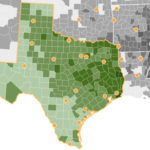WASHINGTON, D.C.—Mayors in seven out of 10 cities in the United States reported increased requests for food assistance in the past year. But three Texas cities whose mayors participated in the survey bucked the national trend.
Emergency food assistance requests increased by an average 7 percent in 25 cities included in the U.S. Conference of Mayors Task Force on Hunger and Homelessness annual report.
The survey asked officials to provide information on the extent and causes of hunger and homelessness in their cities, as well as assistance and services provided, between Sept. 1, 2013, and Aug. 31, 2014.
Helene Schneider, mayor of Santa Barbara, Calif., and co-chair of the mayors’ task force on hunger and homelessness, reported the national survey revealed more than half (56 percent) of the people requesting help were individuals in families. About four in 10 (38 percent) were unemployed. Two out of 10 were elderly, and 7 percent were homeless.
When asked to identify the main causes of hunger, two-thirds of the mayors cited low wages, followed by poverty, unemployment and high housing costs. The mayors prescribed providing more jobs and more affordable housing as top action items to reduce hunger.
 Of the three Texas cities whose mayors participated in the survey, San Antonio reported an 18 percent decrease in requests for food assistance, Dallas reported a 5.7 percent decrease, and Plano reported requests about the same as the previous year.
Of the three Texas cities whose mayors participated in the survey, San Antonio reported an 18 percent decrease in requests for food assistance, Dallas reported a 5.7 percent decrease, and Plano reported requests about the same as the previous year.
Even so, San Antonio distributed more than 52.6 million pounds of food to people in need in the past year, a 7 percent increase, and not everyone who needed help received it.
“Food pantries and emergency kitchens had to turn additional people away due to lack of resources, reduce the quantity of food provided during each visit and/or the amount of food offered per meal at emergency kitchens, and reduce the number of times a person or family could visit each month,” San Antonio Mayor Ivy Taylor said in her report to the conference.
That placed San Antonio in the same category as most of the cities whose mayors responded to the survey. Eight of 10 (82 percent) said emergency kitchens and food pantries had to reduce the quantity of food an individual or family could receive each month, and 77 percent either had to reduce the number of times a client could receive help or turn people away due to lack of resources.
Sign up for our weekly edition and get all our headlines in your inbox on Thursdays
Nationally, Washington, D.C., showed the greatest increase in requests for assistance—56 percent. Also reporting double-digit increases were Philadelphia and Des Moines, Iowa, at 20 percent; Salt Lake City at 16 percent; Charlotte, N.C., at 12.5 percent; Phoenix at 11.3 percent; and Denver at 10 percent.
Other cities reporting increased requests were Asheville, N.C.; Charleston, S.C.; Chicago; Cleveland; Louisville, Ky.; Nashville, Tenn.; Norfolk, Va.; St. Paul, Minn.; Santa Barbara; and Trenton, N.J.
 In addition to San Antonio and Dallas, four other cities reported decreases—Boston; Los Angeles; Providence, R.I.; and San Francisco.
In addition to San Antonio and Dallas, four other cities reported decreases—Boston; Los Angeles; Providence, R.I.; and San Francisco.
The report also revealed the number of families experiencing homelessness increased across surveyed cities by an average 3 percent. Four of 10 cities (43 percent) reported an increase, 35 percent reported a decrease, and 22 percent said the number remained about the same.
“City officials identified lack of affordable housing as the single leading cause of homelessness among families with children,” Schneider said. “This was followed by unemployment, poverty and low-paying jobs.”
Close to one-fourth of the homeless people (22 percent) needing assistance did not receive it. Emergency shelters in about three-quarters (73 percent) of the surveyed cities had to turn away homeless families with children due to lack of available beds, and shelters in six of 10 (61 percent) of the cities had to turn away unaccompanied individuals.
Texas cities posted mixed results in terms of homelessness. The number of homeless families increased by 32 percent in Dallas and 19 percent in San Antonio, while the number of homeless individuals decreased 5 percent in Dallas and 12 percent in San Antonio.
Plano reported no significant change in the number of homeless individuals or families, but officials estimated 84 percent of demand for emergency shelter went unmet.
“It is incredibly unfortunate to continually read reports of families struggling to access food and affordable housing largely due to low wages and part-time employment. I am, however, grateful for the work of agencies, congregations and nonprofits rallying to meet emergency needs of households who desperately need assistance,” said Jeremy Everett, director of the Texas Hunger Initiative, a project in Baylor University’s School of Social Work, launched in partnership with Texas Baptists’ Christian Life Commission.
“At some point, we as people of faith, must elevate the issue of poverty to the forefront of the national conversation, just as our predecessors did before us with issues such as civil rights and slavery. If we do not, I fear we may be the goats Jesus refers to in Matthew 25.”














We seek to connect God’s story and God’s people around the world. To learn more about God’s story, click here.
Send comments and feedback to Eric Black, our editor. For comments to be published, please specify “letter to the editor.” Maximum length for publication is 300 words.